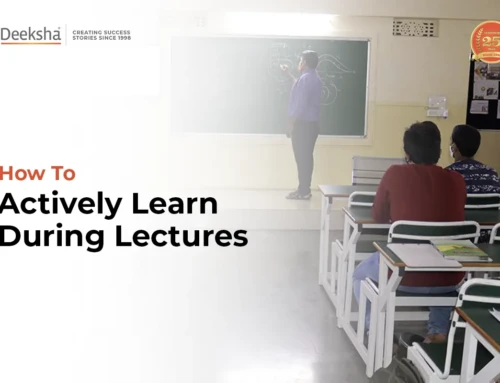Starting the journey to becoming a doctor is both noble and demanding, and it starts with understanding and preparing for the National Eligibility cum Entrance Test (NEET). As you, a 10th grader, stand on the threshold of this significant phase, diving deep into the format, key subjects, and effective preparation strategies for NEET will equip you with the knowledge and skills needed to excel. This exam is your gateway to the medical profession, where science meets compassion, and diligent preparation now can set the foundation for your future success in the medical field. Let’s explore what NEET entails and how you can best prepare for it, ensuring you are well-prepared to turn your dreams of becoming a doctor into reality.
Overview of the NEET Exam
The National Eligibility cum Entrance Test (NEET) is the gateway for students aspiring to pursue careers in the medical field in India. It is the only entrance exam for those looking to enter various undergraduate medical courses like MBBS (Bachelor of Medicine and Bachelor of Surgery), BDS (Bachelor of Dental Surgery), and AYUSH (Ayurveda, Yoga & Naturopathy, Unani, Siddha, and Homeopathy) degrees. As a 10th grader beginning to explore potential career paths, understanding NEET’s structure, requirements, and implications will help in making informed decisions about your future in the medical sector.
Introduction to NEET
Origins and Purpose:
- Start: NEET was first proposed in 2012 but faced several legal challenges and was implemented successfully in 2013.
- Founder: The Central Board of Secondary Education (CBSE) initially administered the exam, but management has since shifted to the National Testing Agency (NTA) as of 2019.
- Purpose: The exam aims to streamline the admission process into various medical colleges across India, making it fairer and more merit-based, eliminating the need for multiple separate entrance exams.
Current Relevance:
- On the Rise?: Yes, the importance of NEET is on the rise due to increasing demand for medical professionals and the growing number of students pursuing medical careers. As India’s population grows and ages, the healthcare industry’s expansion ensures that medical roles will remain crucial.
- Alternatives: While NEET is the primary pathway for medical courses in India, alternative careers in health without NEET include Biomedical Engineering, Psychology, and Health Administration, among others. However, for core medical practice, NEET remains the indispensable route.
Exam Details
- Eligibility: Any student who has completed or is in the final year of their 12th grade with Physics, Chemistry, Biology/Biotechnology, and English as core subjects is eligible to sit for NEET.
- Format: The exam comprises 180 multiple-choice questions divided among Physics (45), Chemistry (45), and Biology (90 – including both Botany and Zoology).
- Duration: 3 hours.
- Scoring: Each correct answer earns 4 points, with a deduction of 1 point for every incorrect response.
Colleges and Opportunities Post-NEET
Clearing NEET opens doors to various prestigious medical institutions across India, including:
- All India Institutes of Medical Sciences (AIIMS)
- Jawaharlal Institute of Postgraduate Medical Education and Research (JIPMER)
- State Government Colleges
- Private Medical Colleges
Admission to these institutes is based on NEET scores, with reservation policies and state-specific quotas playing a part in the selection process.
Future Prospects
The NEET exam is more than just a test; it’s a pivotal stepping stone towards a rewarding career in medicine. Clearing NEET not only paves the way for medical school but also sets the stage for a lifetime of service in improving health and saving lives. For those committed to the long-term challenge and fulfillment that comes with being a healthcare professional, starting early and preparing diligently for NEET can make all the difference.
By understanding the scope and requirements of NEET, you can better prepare for the journey ahead in the medical field. Early preparation, clear understanding of the syllabus, and consistent practice are key strategies that will help you achieve your goal.
Subjects & Syllabus for NEET
The National Eligibility cum Entrance Test (NEET) assesses knowledge in three core subjects: Physics, Chemistry, and Biology. Each of these subjects plays a critical role in the medical field, requiring a deep understanding and the ability to apply concepts practically. As you prepare for NEET, knowing the detailed syllabus for each subject will help you streamline your study plan and focus on relevant topics.
Download latest NEET syllabus – Source: https://www.nmc.org.in/
Physics
Physics in NEET focuses on concepts that provide a foundational understanding of the physical world, which is crucial for medical technologies and understanding physiological processes. The syllabus covers a range of topics:
- Mechanics: Concepts such as motion, force, laws of motion, work, energy, and power.
- Thermodynamics: Heat, temperature, and the laws of thermodynamics, which are pertinent to many physiological processes.
- Electrodynamics: Electric charges and fields, capacitors, currents, magnetic effects of current, electromagnetic induction, and alternating currents.
- Optics: Reflection, refraction, wave optics, and instruments, crucial for understanding vision and various optical instruments used in medicine.
- Modern Physics: Atomic models, nuclear physics, and radiation, essential for diagnostic techniques like X-rays and treatment methods like radiation therapy.
Chemistry
Chemistry in NEET helps in understanding chemical reactions, compositions, and properties of matter — all of which are vital in pharmacology and metabolic processes. The syllabus includes:
- Physical Chemistry: Structure of atom, states of matter, thermodynamics, equilibrium, redox reactions, electrochemistry, chemical kinetics, and surface chemistry.
- Inorganic Chemistry: Classification of elements, periodicity in properties, chemical bonding and molecular structure, coordination compounds, and environmental chemistry.
- Organic Chemistry: Basic concepts in organic chemistry, hydrocarbons, halogen derivatives, alcohol and ethers, carbonyl compounds, organic compounds containing nitrogen, biomolecules, polymers, and everyday chemistry.
Biology
Biology carries the highest weight in NEET, covering both Zoology and Botany. This subject is directly relevant to the medical field, encompassing the complexity of living organisms from a cellular level to the whole organism.
- Diversity in Living World: Classification of living organisms, and an overview of kingdoms and species.
- Structural Organization in Animals and Plants: Morphology and anatomy of plants and animals, essential for understanding biological functions and structures.
- Cell Structure and Function: Detailed study of the cell, the basic unit of life, and cellular metabolism.
- Plant Physiology: Photosynthesis, respiration, plant growth, and development.
- Human Physiology: Detailed workings of the human body, including digestion, excretion, nervous and muscular movements, reproduction, and more.
- Reproduction: Reproduction in plants and animals, sexual and asexual reproduction, and reproductive health.
- Genetics and Evolution: Principles of inheritance, molecular basis of inheritance, and the evolutionary biology of organisms.
- Biology in Human Welfare: Health and diseases, biocontrol, and plant breeding.
- Biotechnology: Principles and applications in health and agriculture.
- Ecology and Environment: Environmental issues, ecosystems, biodiversity, and its conservation.
Understanding and mastering the vast syllabus of NEET requires dedication, systematic study, and practice. It’s advisable to create a detailed plan, covering each topic methodically and revisiting them through revision. Using diagrams, charts, and models can help in memorizing and understanding complex concepts, especially in biology. For areas like physics and chemistry, solving numerical problems and applying theoretical knowledge in practical scenarios will enhance your comprehension and retention, preparing you thoroughly for the challenges of NEET.
Preparation Tips for NEET
Succeeding in the NEET exam requires a well-rounded preparation strategy that encompasses understanding the syllabus, rigorous practice, and efficient time management. Here’s a comprehensive guide to help you, a future medical aspirant, prepare effectively for NEET.
1. Understand the Syllabus
- Detailed Review: Begin by thoroughly reviewing the NEET syllabus. Know the weightage of each subject and topic to prioritize your studies accordingly.
- Reference Books: Utilize NCERT textbooks for Biology, Chemistry, and Physics as your primary study materials since NEET questions are largely based on these texts.
Enhanced Learning with Deeksha’s Integrated Coaching
- Curated Curriculum: At Deeksha, we offer a specially curated curriculum designed by expert faculties that integrates the requirements of both the PU board and competitive exams like NEET. This integrated approach helps students excel academically in their PU exams while simultaneously preparing for NEET.
- Expert Guidance: Our experienced faculty members are adept at simplifying complex topics, making it easier for students to grasp difficult concepts quickly. This targeted guidance is crucial in boosting your understanding and retention of the vast NEET syllabus.
- Strategic Preparation: By enrolling at Deeksha, students benefit from an educational environment that fosters both knowledge enhancement and strategic exam preparation. This dual focus ensures that students not only score well in their board exams but also excel in NEET.
2. Create a Realistic Timetable
- Daily Schedule: Break your study time into manageable chunks. Allocate specific times for each subject based on your proficiency and the subject’s difficulty and importance.
- Regular Breaks: Include short breaks to prevent burnout. Studying for long hours without breaks can decrease productivity.
Optimized Learning with Deeksha’s Structured Timetables
- Active Learning Post-Lunch: At Deeksha, we understand the importance of maintaining concentration throughout the day. To combat post-lunch sluggishness, practical classes are scheduled after lunch breaks, encouraging hands-on learning and keeping students engaged through interactive and practical involvement.
- Pomodoro Technique: We employ the Pomodoro technique to enhance focus. This method involves studying in blocks of time, typically 25 minutes long, followed by a 5-minute break. This technique helps in maintaining high levels of concentration throughout longer study periods.
- Structured Exam Preparation: Our timetables are meticulously planned to intersperse theoretical learning with periodic revisions and tests. This structured approach ensures that students frequently revisit and reinforce the concepts they’ve learned, thereby aiding in better retention and understanding.
3. Use the Right Study Materials
- Standard Books: Beyond NCERT, consider reference books and guides that are recommended by NEET experts and top rankers.
- Online Resources: Use online platforms for supplementary learning—video tutorials, webinars, and interactive lessons can provide clarity on complex topics.
Advanced Resources at Deeksha
- Industry-Standard Study Materials: At Deeksha, we ensure that our students have access to the best study materials available. This includes not only the most recommended textbooks and guides for NEET but also specialized resources that are recognized for their quality and relevance to the exam.
- Faculty-Prepared Notes: Our experienced faculty members prepare detailed notes that serve as comprehensive guides to each topic. These notes are tailored to simplify complex concepts and are constantly updated to align with the latest NEET syllabus, ensuring that our students have the most current and effective content at their fingertips.
- Extensive Library Facilities: Deeksha boasts an extensive library stocked with a vast collection of books and reference materials that students can use for deeper research and understanding. This resource is invaluable for students who wish to explore topics at length or require additional material to enhance their preparation.
4. Practice Regularly
- Practice Questions: After studying each topic, solve practice questions to reinforce learning and identify weak areas.
- Past Papers: Regularly solve previous years’ NEET papers and take timed mock tests to get used to the exam’s format and time constraints.
Comprehensive Practice at Deeksha
- Access to Previous Question Papers: At Deeksha, students have access to an exhaustive collection of previous NEET question papers. This resource is invaluable for understanding the types of questions typically asked and the overall pattern of the exam.
- Test Series Reflecting Exam Patterns: Our test series are meticulously designed to cover the most frequently asked questions and incorporate any new patterns observed in recent exams. This alignment with the actual NEET format ensures that students are practicing with the most relevant and up-to-date material.
- Mock Tests for Anxiety Reduction: By regularly participating in mock tests that mimic the actual NEET environment, students at Deeksha can reduce exam anxiety and build familiarity with the exam setting. This practice helps eliminate fear and boosts confidence, ensuring students are psychologically prepared for exam day.
- Feedback and Evaluation System: After each test, students receive detailed feedback highlighting their strengths and areas for improvement. This feedback system is critical for helping students identify their weak points and focus their studies more effectively. Additionally, faculty members are available to discuss these assessments, providing personalized advice and strategies to improve.
5. Focus on Weak Areas
- Identify Weaknesses: Regular practice tests will help highlight areas where you struggle.
- Targeted Practice: Devote more time to these areas to improve your understanding and performance.
Tailored Support at Deeksha
- Customized Learning Plans: At Deeksha, we recognize that every student has unique strengths and weaknesses. Our approach involves creating customized learning plans that focus specifically on an individual’s areas of difficulty. This personalized attention ensures that no student’s needs are overlooked and that everyone has the best chance to excel.
- Dedicated Remedial Sessions: We offer remedial classes where students can receive extra help on challenging topics. These sessions are designed to provide additional support and guidance, allowing students to tackle their weak areas with the help of experienced faculty.
- Collaborative Learning: Peer study groups are encouraged at Deeksha, providing a supportive environment where students can learn from each other. Discussing and explaining concepts to peers is an excellent way for students to reinforce their own knowledge and address gaps in understanding.
- Continuous Feedback Loop: Our faculty regularly reviews student performance and provides constructive feedback. This ongoing evaluation process helps in consistently identifying areas where a student may be lagging and promptly addressing them. The feedback is not just about pointing out weaknesses but also includes guidance on how to improve and leverage strengths.
6. Join Deeksha to Boost Your Chances of Clearing NEET
Joining a coaching institute like Deeksha can significantly enhance your preparation for NEET by providing structured learning, expert guidance, and consistent practice in a competitive environment.
Benefits of Enrolling at Deeksha:
- Integrated Coaching Approach: At Deeksha, we combine the rigor of PU board preparation with NEET coaching. This integrated approach ensures that students are well-prepared not only for their board exams but also fully equipped to excel in NEET.
- Expert Faculty: Our faculty members are specialists in their respective subjects with years of experience preparing students for competitive exams like NEET. They use innovative teaching methodologies that make complex concepts easier to understand and retain.
- Regular Testing and Review: We conduct regular tests that mimic the format and difficulty of NEET, allowing students to get accustomed to the exam’s pressure and pacing. These tests are followed by detailed analysis sessions where students can learn from their mistakes and understand their performance trends.
- Resource Accessibility: Deeksha provides access to extensive study materials, including customized notes, practice tests, and reference books, all curated to align with NEET requirements. Our well-stocked libraries and online resources ensure that students have everything they need at their fingertips.
- Peer Learning Environment: Studying alongside peers who are equally motivated can drive students to push their limits. The competitive yet collaborative atmosphere at Deeksha fosters a healthy academic environment that is conducive to learning and growth.
- Stress Management and Motivational Support: Preparing for NEET can be a stressful experience. At Deeksha, we provide workshops and sessions on stress management, motivation, and effective study techniques to help students maintain their mental well-being and stay motivated throughout their preparation journey.
7. Revision is Key
- Systematic Revision: Schedule regular revision sessions to go over the subjects and topics you’ve covered. This helps in long-term retention of information and clarity of concepts.
- Revision Notes: Make brief notes highlighting key points and formulas during your first study session, which can be extremely useful during revision.
At Deeksha, we integrate structured revision schedules into daily learning, emphasizing cumulative tests and interactive sessions to solidify understanding and improve recall, ensuring students are exam-ready with confidence.
8. Stay Healthy
- Balanced Diet: Maintain a healthy diet. Brain-boosting foods can enhance memory and concentration.
- Physical Exercise: Regular physical activity can improve mental acuity and reduce stress.
- Adequate Sleep: Ensure you get at least 7-8 hours of sleep daily to improve focus and retention.
While academic preparation is critical, maintaining your health during this period is equally important. At Deeksha, we understand that a healthy body fosters a sharp mind. Although we cannot directly manage every aspect of our students’ health, we ensure that all our campuses are well-maintained and hygienic, providing a safe and conducive learning environment.
We also encourage our students to adopt healthy living practices—eating nutritious meals, getting adequate rest, and managing stress effectively. These habits are essential for sustaining the energy and focus needed for intensive study sessions. By taking care of their well-being, students can maximize their performance not only in their studies but in every aspect of their lives.
9. Manage Time Efficiently
- During Exam: Prioritize questions based on your strengths during the exam. Attempt easy questions first to secure safe marks and then move on to more challenging ones.
- Time Allocation: Practice managing your time during mock tests to ensure you can comfortably complete all questions within the allotted time during the actual exam.
At Deeksha, we help students master time management through a meticulously structured timetable that balances academic and personal time, ensuring efficient use of every hour. Our approach teaches students to prioritize tasks and prepare for NEET without feeling overwhelmed.
10. Stay Updated and Connected
- Latest Updates: Keep yourself updated with any changes in the NEET exam pattern or important dates.
- Guidance: Stay connected with mentors and teachers who can provide emotional support and valuable advice throughout your preparation journey.
Deeksha keeps students informed and connected through regular updates on NEET trends and changes. Our dedicated platforms ensure that students have access to the latest information and resources, fostering a collaborative and informed community that supports each other’s academic journey.
Remember, preparing for NEET is a marathon, not a sprint. It requires perseverance, discipline, and a strategic approach. By following these preparation tips, maintaining a positive outlook, and dedicating yourself to consistent study, you can enhance your chances of achieving a top score in NEET and securing a seat in a prestigious medical college. Remember, every hour you put in diligently brings you one step closer to your dream of becoming a doctor.
NEET Exam Scoring Guide
Understanding how the National Eligibility cum Entrance Test (NEET) is scored is crucial for any candidate. This knowledge helps in strategizing your preparation and maximizing your performance during the exam. Here’s a detailed guide on the scoring system of the NEET exam, including insights into the marking scheme, calculation of scores, and how the results are used for admissions.
NEET Marking Scheme
- Total Questions and Marks: NEET comprises 180 multiple-choice questions (MCQs) with a total of 720 marks.
- Subjects Covered:
- Physics: 45 questions
- Chemistry: 45 questions
- Biology (Botany + Zoology): 90 questions (45 each)
- Marks Allocation:
- Each correct answer awards you +4 marks.
- Each incorrect answer results in a deduction of 1 mark (-1).
- No marks are deducted or awarded for questions that are not attempted.
Calculating Your NEET Score
The score in NEET is calculated using the following formula:
NEET Score=(Number of Correct Answers×4)−(Number of Incorrect Answers×1)
NEET Score=(Number of Correct Answers×4)−(Number of Incorrect Answers×1)
For example, if a candidate answers 150 questions, with 130 correct answers and 20 incorrect answers, their score would be calculated as follows:
NEET Score=(130×4)−(20×1)=520−20=500
NEET Score=(130×4)−(20×1)=520−20=500
How Scores Affect Your NEET Results
- Percentile Score: NEET results also include a percentile score, which is a comparison of your performance with all other candidates who appeared in the exam. The percentile score is calculated using the formula:
Percentile Score=(Number of Candidates with Scores BELOW Yours / Total Number of Candidates)×100
- Tie-Breaking Criteria: In cases where two or more candidates have the same score, the tie is resolved using the following criteria:
- Higher marks in Biology.
- Higher marks in Chemistry.
- Fewer incorrect answers in all the subjects.
- Older in age.
NEET Cut-off Scores
- Qualifying Cut-off: The cut-off marks are the minimum scores required to qualify in the NEET exam. These are typically expressed in percentile:
- General category: 50th percentile
- SC/ST/OBC: 40th percentile
- General-PH: 45th percentile
- SC/ST/OBC-PH: 40th percentile
- Admissions: The actual cut-off marks for admission into various medical colleges can vary widely depending on the number of seats available, the number of candidates, and the difficulty level of the examination. Higher-ranked colleges typically have higher cut-off marks.
Importance of Score and Rank
- All India Rank (AIR): Your NEET score is used to generate your All India Rank (AIR), which is crucial for admissions. The AIR is used in counseling sessions for seat allocation in various colleges under the All India Quota and state-level quotas.
- State Rank: Some states also use state ranks for admissions to the seats reserved under the state quota. These ranks are derived from your NEET scores but are specific to candidates from the respective states.
Maximizing your NEET score is about more than just knowing the material; it’s also about understanding the scoring system and using it to your advantage. A strong focus on accuracy, rather than merely attempting all questions, can help maximize your score. Understanding this scoring guide can aid in effective exam strategy formulation, which is as crucial as your hard work and preparation.
Message to all graduating from 10th grade
As you stand on the precipice of a significant academic transition after graduating from 10th grade, the choices you make now will sculpt your future. The path to becoming a healthcare professional through the NEET exam is arduous but profoundly rewarding, offering the opportunity to make a tangible difference in people’s lives.
At this juncture, choosing the right environment for your Pre-University education is crucial. An institution like Deeksha not only offers excellent academic guidance but also provides an integrated coaching approach that seamlessly blends PU board syllabus preparation with competitive exam training, such as NEET. This method ensures that you do not have to divide your efforts between board exams and entrance tests, making your preparation more streamlined and efficient.
Joining Deeksha can be a transformative step for your career. Our expert faculty, tailored study materials, and consistent test preparation are designed to ensure you excel both in your Pre-University exams and in securing a top rank in NEET. With Deeksha, you are not just prepared for exams; you are prepared for a future in medicine.
As you move forward, remember that the journey to a career in medicine is as demanding as it is fulfilling. It requires dedication, resilience, and a passion for learning. With Deeksha’s support, you are well-equipped to meet these challenges head-on. Embrace this opportunity to build a strong foundation for your academic and professional future, and step confidently toward achieving your dreams.








Get Social